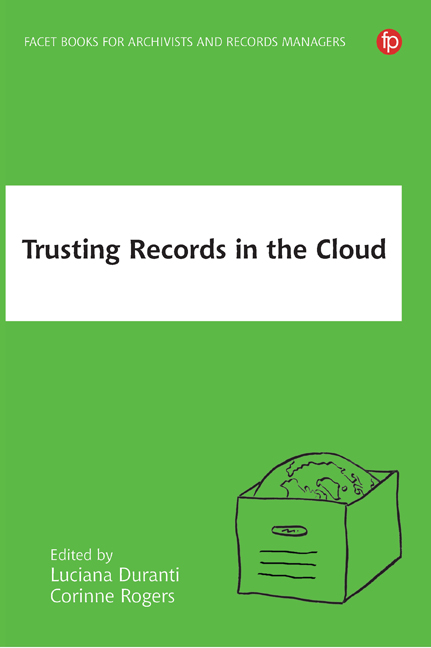Book contents
- Frontmatter
- Contents
- List of Figures and Tables
- Contributors
- 1 Introduction
- 2 The Cloud – Challenges and Issues
- 3 Open Government
- 4 Citizen Engagement
- 5 Strategies, Methods and Tools Enabling Records Governance in a Cloud Environment
- 6 Retention and Disposition
- 7 Authentication
- 8 Intellectual Control
- 9 Exploring Digital Preservation in the Cloud
- 10 Cultural Heritage – Indigenous Perspectives
- 11 The Role of the Records Professional
- 12 Education
- Appendix 1 InterPARES Trust Terminology
- Appendix 2 Products of InterPARES Trust Research
- Index
Appendix 1 - InterPARES Trust Terminology
Published online by Cambridge University Press: 24 September 2019
- Frontmatter
- Contents
- List of Figures and Tables
- Contributors
- 1 Introduction
- 2 The Cloud – Challenges and Issues
- 3 Open Government
- 4 Citizen Engagement
- 5 Strategies, Methods and Tools Enabling Records Governance in a Cloud Environment
- 6 Retention and Disposition
- 7 Authentication
- 8 Intellectual Control
- 9 Exploring Digital Preservation in the Cloud
- 10 Cultural Heritage – Indigenous Perspectives
- 11 The Role of the Records Professional
- 12 Education
- Appendix 1 InterPARES Trust Terminology
- Appendix 2 Products of InterPARES Trust Research
- Index
Summary
The InterPARES Trust Terminology is drawn from the evolving intersection of recordkeeping and information technology, exploring aspects of trust in networked environments. Established social conventions of trusting archives has been based, in large part, on the notion of tangible records in the custody of an archival repository. If an archives delegates custody of its records to a third party, such as a cloud service provider, assumptions underlying those social conventions have changed and should be re-examined.
This terminology is a starting point to clarify the meaning of the words and phrases that represent not only the emerging technical concepts, but also those underlying assumptions. The meaning of a term representing a relatively new concept is often ambiguous because it is not yet well established or may be used with a variety of senses. Over time, especially as the implications and imple - mentations of these new concepts mature, they take on a consensual meaning. For example, when first introduced, ‘cloud’ was particularly nebulous. Some argued that it was merely a new word for existing technologies such as distributed storage. Others argued that it was substantially different, incorpor - ating notions of storage as a service independent of implementation. Marketers often used ‘cloud’ to promote existing products and services as new and inno - vative. In the past several years, the notion of cloud computing has been clarified and expanded.
At the same time, terms with established meanings are often learned through use in context, rather than formal study. As such, terms may be used imprecisely or without a full understanding of their meaning. For example, many individuals have a working sense of ‘trust’, but they might not be able to provide a concise or considered definition. While many of these terms can be found in standard reference works, the terminology includes definitions and notes written specifically in context of archives and technology.
The terminology's definitions are descriptive, reflecting how a term is used in the literature. The online version typically includes examples used to justify the definition. At the same time, those citations often provide explanation beyond what is appropriate for a concise definition. In addition to these citations, terms often have a note that provides a gloss on meaning and usage.
- Type
- Chapter
- Information
- Trusting Records and Data in the Cloud , pp. 267 - 286Publisher: FacetPrint publication year: 2018
- 3
- Cited by



